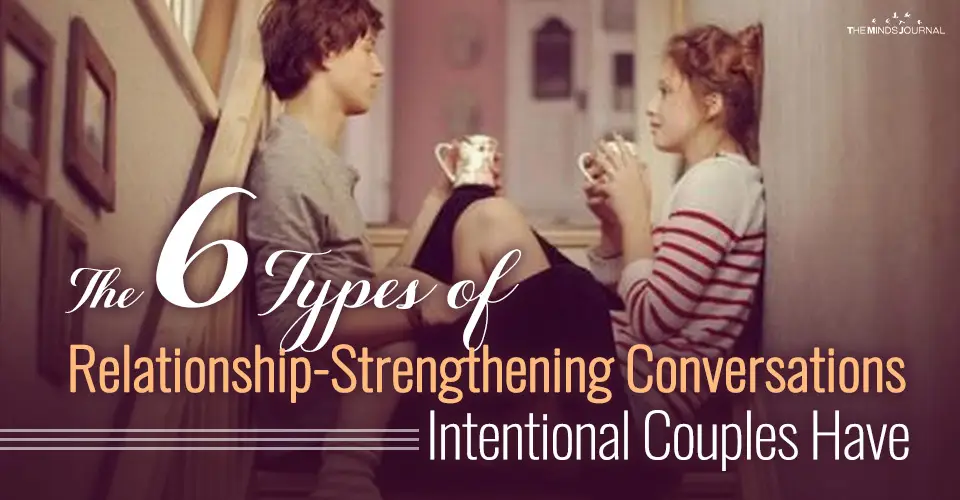Making a relationship happy and healthy shouldn’t be a challenge. It should happen naturally. And the key to building a happy partnership is intentional communication. By having the right type of conversations you can keep the spark alive in your relationship regardless of how long you’ve been together. Talking honestly and openly about both good and hard topics will not only enhance intimacy in the relationship, but also strengthen your friendship. Talking the talk can help you grow closer, even when it’s not exactly what you might want to hear at times. Happy couples ask the hard questions to better understand their partners and build a stronger, more committed relationship.
“Few dating couples would get married if they had as little focused conversation as most married couples do.” – Dr. Bill Doughty, The Intentional Family
How couples talk to one another and what they discuss determines the way partners stay emotionally connected within their relationship.
For example, dual-income couples with kids, as observed by researchers, focused on mostly talking about household chores, daycare, and groceries.
I don’t know about you, but talking about picking up celery at the grocery store doesn’t make me feel loved.
The key to intentionally creating an intimate relationship is having a variety of relationship strengthening conversations, almost like adding different spices to the meals you cook. Each spice offers a new flavor of deliciousness.
Some spices are rather dull but necessary to build baseline substance; some are bitter and are an acquired taste, and others create an indulgent sensation of pleasure.
The 6 Types of Relationship Strengthening Conversations
Type 1: Routine Conversations
Routine conversations include discussions about chores, who’s taking the kids to what, what’s for dinner, and scheduling events, including date night.
These conversations are essential to accomplish practical things and to prevent items from falling through the cracks.
However, most often these type of relationship strengthening conversations do not create a felt sense of emotional connection and intimacy. When Stacy asks Dave to vacuum, it’s unlikely Dave will gaze into her eyes and in a loving voice say, “I am going to vacuum this entire house!”
When couples end up unintentionally devoting the majority of their time and energy to routine conversations, their emotional intimacy will begin to fade, since they end up having nothing left over to energize their relationship.
It’s important to remember to be mindful of your tone of voice and to be conversational, rather than demanding or critical when having these types of relationship strengthening conversations. Sometimes the routine conversation about plans can quickly lead to an escalated conflict based on how partners say things.
If household management is a conflict in your relationship, read: 4 Common Solvable Problems in Romantic Relationships
Type 2: Friendship-Strengthening Conversations
Couples often fall in love by getting to know each other. And then they often fall out of love because they forget to continue to get to know each other over the years. They stop asking questions and stop learning about each other and themselves.
“When we are no longer open to getting to know our partners, we are no longer open to a relationship and love.”
– Kyle Benson, The Human Heart Was Made To Be Known And Loved
Being known by and knowing your partner is what builds a strong friendship in your relationship. Insecure, happy, and long-lasting relationships, partners are each other’s best friends.1
They share funny stories about the kids or work and listen to each other. Each one knows their partner’s frustrations, as well as their joys, personality quirks, hopes, and dreams.
Couples heading for trouble allow conflicts to consume friendship conversations—so much so that they stop asking intimate questions.
The good news is the research on relationship workshops(2) indicates that couples cherish the idea of becoming close friends and can do so instantly. Being a friend is less about learning skills and more about shifting your attitude.
Friendship talk is the number one way to make sure that you and your partner remain connected and in-tune with one another. The goal of this type of relationship strengthening conversation is to have uninterrupted time to just be together and continue to learn about each other.
Tips for Continuing to Build a Strong Friendship:
- Consistently ask open-ended questions that get to the heart of who your partner is at this moment (Hint: The 7-Day Emotional Connection Challenge is a great starting point).
- Check-in with your partner about upcoming events in your life as individuals and as a family.
- Share good news and celebrate, even in small ways, such as giving a high five or big kiss. Or bigger ways, such as with dinner, drinks, and/or dessert.
- Share important memories from your childhood when they come to mind.
- Talk about personal or life goals and dreams.
- Share personal projects you’re working on or interested in. Ask your partner what they love or find pleasurable and meaningful about the project they are working on.
- Schedule a playdate with each other and do something exhilarating together.
“A friend is someone who is glad to see you and doesn’t have any immediate plans for your improvement”
– Bill Coffin of the U.S. Navy 3
If you don’t prioritize having friendship talk, and you eventually stop having them completely, both partners will forget why they fell in love with one another (or even why they like each other) in the first place.
“Enhancing friendship in your marriage is an investment that will pay off over time in happiness and relationship satisfaction.”
– Fighting For Your Marriage
Type 3: Support Conversations: “I Have Your Back”
When your partner is hurting what do you do? How do you offer support that your partner needs?
“When you’re hurting, the world stops, and I listen.” – Dr. John Gottman
Research has shown that emotional and physical support from a lover enhances personal well-being, especially under stress.(4) Researchers also discovered that feeling confident you can get the support you need and want from your partner is just as important as receiving that support.
“Although there is some mystery about whom we fall in love with, there is less mystery in what makes for a successful, rewarding relationship…Two of the key elements…are a safe haven and a secure base.”
– Wyndol Furman
Dr. Furman(5) advises dating partners not to commit to a relationship unless they have been through a difficult time and each found their partner was supportive in a way that was helpful.
Essentially, relationship security is having faith that your partner will be there for you when you need them. This is the essence of a secure attachment bond.
In attachment world, we evaluate how well partners offer each other a safe haven—a place of emotional and physical refuge—when one of them is hurt, and a secure base from which they can go explore the world with curiosity knowing that they have a person who is cheering them on and will be there if needed.
Making time to give and ask for support is a key way in which you can show your partner that you care for them, understand what they’re going through, and have their back.
How we provide that support and what we say is crucial. As much as it might be second nature to offer advice to your partner during their trials, support talk involves listening, validating, and just being there for your partner.
Not only does this help them feel secure in the relationship, but also helps put negative assumptions (“she doesn’t care about me”) at ease, so that feelings of not feeling cared for during small events aren’t triggered during more serious events.
Types of support:
- Being there physically (in-person, on the phone, via text, etc.).
- Doing things you may not normally do that make life easier for your partner when they are going through a stressful time.
- Offering encouragement if your partner is going through something stressful, such as a job interview or something scary to them.
- Listening to your partner vent. Don’t try to solve problems for your partner, just listen. A great way to practice this is to have a stress-reducing conversation. “Scheduling formal griping sessions can prevent the spillover of everyday stress into your marriage” – Dr. Gottman, The Seven Principles for Making Marriage Work
- Offer emotional support when your partner is going through a difficult time.
- Support goals and dreams. “In a successful relationship, your partner encourages you to develop your interest and talents…[Y]our partner is your number-one fan” – Wyndol Furman
- Offer physical touch and support, such as a long hug, cuddling, and hand-holding. This offers your partner a felt sense that you are there for them even without saying a word.
It’s important that partners not only offer support but also talk openly about the types of support they need and how they offer support.
Like love languages, some forms of support are more meaningful to your partner, even ones that you may not find meaningful. Learning to offer support in the way that is most meaningful for your partner can drastically improve how supported your partner feels and vice versa.
Type 4: Conversations Centered on Affection and Appreciation
To build a strong relationship, it’s vital to create a culture of love, respect, and care. You can do this in small ways that can create lasting changes over time.
“Small things often.” – Dr. Gottman’s motto
Make an intentional effort to think relationship-enhancing thoughts and to verbalize or make loving gestures towards your partner.
Saying things even as simple as,
- “I appreciate that you took the garbage out today. I love how I can count on you to help out around the house.”
- “I love how you listen to what’s going on in my life. It makes me feel important and I appreciate that I can share that with you.”
- “I cherish how much you care for our kids. It’s amazing to watch your parent and I truly admire how great of a person you are.”
Can you imagine what your relationship would be like if you and your partner regularly made statements and gestures like this to each other?
Take time to ask your partner what makes them feel most loved:
- What makes you feel most loved by me?
- What forms of affection, physical or verbal, help you feel important and loved?
Just as there are two experiences in every relationship, there are at least two different ways of feeling loved. Understanding and loving each other in the way each unique partner feels loved keeps the relationship strong.
Type 5: Relationship Enhancement Conversations (Conflict)
As much as we may hate conflict talk, it is necessary to make sure challenges, disagreements, and conflicts are dealt with constructively.
All relationships have conflict, but how lovers talk to each other about challenges determines how well the couple manages the problems to create win-win solutions.
“Within your conflicts, lies the greatest opportunity for intimacy.” – Dr. John Gottman
For couples, I recommend scheduling a weekly State of the Union meeting because the most effective intervention is prevention.
Here is the State of the Union meeting structure:
- Set aside 30 minutes to an hour and find a place where both partners can be fully present and engaged. This means no distractions. Finally, check-in with yourself to make sure you are ready to talk emotionally and are open to your partner’s experience and perspective.
- Share five things you love, cherish, and/or appreciate about your partner. This reminds you that you love each other and are allies.
- Pick a speaker and listener. As the listener, ask the speaker the following: “What went well in our relationship this week?” Listen, summarize what you heard, and validate your partner’s experience. Then switch.
- Once you both feel like you’ve shared all the positives, then have the listener ask, “What occurred this week that we can improve on?” The goal is just to make a list (if necessary), not to actually start discussing the events or issue. Then switch roles.
- After you have your improvement items, pick one key topic and choose a speaker and a listener. Switch roles throughout this relationship strengthening conversation and focus only on understanding each other completely.
- After both of you can say, “I feel completely understood,” then work together to find an agreeable win-win solution. Even if it is just something temporary you are trying out for the next week. Sometimes you won’t even need this. Just discussing it may be enough because feeling heard and validated is all partners need.
- Finish by acknowledging each other for staying engaged and by saying one thing you love about each other. Then ask, “What is one thing I can do to help you feel more loved this week?”
Imagine how much your relationship would improve if you were proactive about what went well and what areas need some adjusting in the relationship?
For those conflict avoiders, doing this actually leads to less “out of nowhere” conflict in the relationship. I know you hate that kind of conflict. Not to mention you might learn a thing or two about what you do well and what your partner cherishes about you.
Do you also notice all the positivity embedded in the conflict conversation?
There is a magic ratio of positive to negative interactions even during the conflict that helps keep the conversation constructive and beneficial.
Remember to speak soften and do your best to listen non-defensively.
“Whether you are the listener or the speaker, you have equal responsibility for the success of the conversation.” – Patt Hollinger Pickett, PhD
Type 6: Sensuality & Sexuality Conversations
As I shared in a previous article, Couples That Talk About Sex Have Better Sex. This includes not only sexual acts but also forms of foreplay and romance.
Trying to guess what turns your partner on by the sounds they make in the bedroom is kind of like pinning the tail on the donkey blindfolded. You’re guessing. This is why openly talking about it can be helpful. (6)
Furthermore, research has estimated that 85% of sexual challenges can be resolved by giving partners permission to explore their sexuality and having accurate information about desire, arousal, and sex. (7)
In long-term relationships, the tendency is to skip the sensual aspects of lovemaking and get to the mechanics of the peak act.
The lack of time and energy spent playfully and curiously exploring each other’s bodies and minds can lead to partners feeling like they are growing apart or that they are used as an object, rather than being relished in as a sexual being.
“There needs to be a place for romance and for sexual talking and touching your relationship – both in and outside the context of making love.” – Fighting for Your Marriage.
Helpful Tips:
- Create a body map of your partner and while touching all parts of their body they are comfortable with you touching, make a mental note of the areas they find sensitive and pleasurable.
- Passionately kiss your partner at random times without getting intimate.
- Take your time exploring each other’s genitals and exploring your own. They’re all beautiful.
- Try novel places, positions, and ways of touching or being intimate with each other.
- Ask each other questions to learn about each other’s turn-ons and -offs.
- Make sure your relationship is strong, too. Often it is not having a strong friendship, lacking commitment, feelings of insecurity, or nasty conflict that cause sexual desire to die in a relationship.
- Read some books and watch videos from certified sex educators, who embody sex positivity, to learn more about yourself and your partner.
Reflection
Studies have found that most happy couples admit open conversations and great communication skills have significantly helped them stay together for years. This means that not only you clearly communicate what you need from your partner but also ask them what they need from you as a lover. You need to check with them about what’s bothering them and what they find exciting on a regular basis. This means respecting your partner even at times of conflict and not using their vulnerabilities just to hurt them to simply win the fight. Open conversations about your thoughts, emotions, desires, goals and life will help you stay connected with your partner for years to come.
You can find some valuable tips on how to communicate better for healthier relationships here:
How many of these types of relationship strengthening conversations do you have in your relationship? What types of conversations would you like to have more of?
With Love,
Kyle Benson
1. It is my belief that lovers should be each other’s best friends. Research from Gottman, Prep, and other approaches. I think this can also be taken too far if romantic partners expect and sometimes demand their partners to be everything for them. Esther Perel talks more about this in her Ted Talk.
2. (a)Babcock, J. C., Gottman, J. M., Kimberly, D. R., & Gottman, J. S. (2013). A component analysis of a brief psycho-educational couples’ workshop: one-year follow-up results. Journal of Family Therapy, 35, 252–280. doi: 10.1111/1467-6427.12017. 3. (b)Hawkins, A. J., Blanchard, V. L., Baldwin, S. A., & Fawcett, E. B. (2008). Does marriage and relationship education work? A meta-analytic study. Journal of Consulting and Clinical Psychology, 76, 723–734.
3. This quotation comes from the book Fighting for Your Marriage by Markman, Stanley, and Blumberg pages 228–229.
4. (a)Bodenmann, G., & Shantinath, S.D. (2004). The Couples Coping Enhancement Training (CCET): A new approach to prevention of marital distress based upon stress and coping. Family Relations, 53, 477–484 (b)Johnson S.M., Moser M.B., Beckes L., Smith A., Dalgleish T., et al. (2014) Correction: Soothing the Threatened Brain: Leveraging Contact Comfort with Emotionally Focused Therapy. PLOS ONE, 9(8): 1054-1089.
5. Furmen, W. (2001). What should fools find in love? In J. R. Levine & H. J. Markman (Eds.), Why do fools fall in love? San Francisco: Jossey Bass. 67-71.
6. This can be difficult depending on the family, religious, and cultural messaging. If you are open, I would challenge exploring this so you can have a more positive relationship with your sexuality.
7. This comes from research on the PLISSIT model of sexual education and therapy. For example, John was sexually frustrated with Jane because she never initiated sex. John’s sex-ed courses never taught him that men, typically, tend to have more spontaneous sexual desire than women. And women typically have a more responsive sexual desire that is context-dependent. By strengthening the romantic relationship and creating an environment for responsive desire in the relationship the sexual frustration was no longer an issue.
If you want to transform conflict into material to build a stronger and more connected relationship then read Kyle Benson’s conflict blueprints here.
Written by Kyle Benson
Originally appeared in Kyle Benson
You may also like:
8 Important Conversations Before Marriage
7 Enhancing Lovemaking Conversations For Couples
3 ‘Love Language’ Communication Skills That Will Strengthen Your Relationship
State of the Union Meetings Will Strengthen Your Relationship: Here’s How to Start Yours
10 ‘Taboo’ Things That Might Actually Strengthen Your Relationship









Leave a Reply
You must be logged in to post a comment.